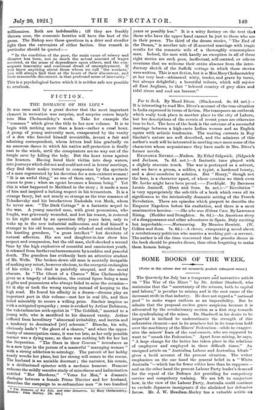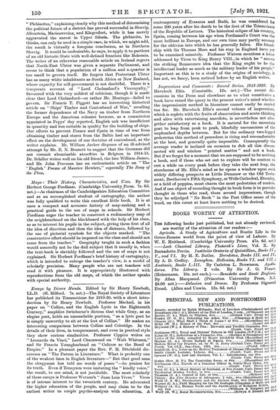SOME BOOKS OF THE WEEK.
(Notice In this column does not necessarily preclude subsequent review.] The Quarterly for July has a temperate arid instructive article on "The War of tho Mines" by Dr. Arthur Shadwell, who maintains that the "uncertainty of the returns, both to capital and labour," is peculiar to mining and is the root cause of the incessant strife in that industry. He does not regard a " national pool" to make wages uniform 118 an impossibility. But he admits that the proposal excites grave suspicion because it is advocated by the revolutionary section as a first step towards the syndicalizing of the mines. Dr. Shadwell in his desire to be impartial is inclined to underestimate the strength of this subversive element—not in its numbers but in its tenacious bold over the machinery of the Miners' Federation—while he exagger- ates the miners' fears of the coal-owners, who are supposed to want to "smash the Federation." Apart from mining, he says, "A large change for the better has taken place in the relations of employers and employed in these difficult times." An unsigned article on "Australian Labour and Australian Ideals" gives a lucid account of the present situation. The writer emphasizes on the one hand the general belief in a "White Australia "—which has far fewer critics here than be supposes— and on the other hand the present Labour Party leader's demand for the repeal of the Defence Act providing for compulsory service and compulsory training. We are left to conjecture how, in the view of the Labour Party, Australia could continuo to exclude Japanese immigrants if she abolished her defensive forces. Mr. J. W. Heatllam-Morley has a valuable article OM "Plebiscites," explaining clearly why this method of determining the political future of a district has proved successful in Slesvig, Allenstein, Marienwerder, and Klagenfurt, while it has merely aggravated the unrest in Upper Silesia. The plebiscite, he thinks, can only be used in a simple case, in which, we might add, the result is virtually a foregone conclusion, as in Northern Slesvig. It would be undesirable, he says, to apply it to portions of an old historic State with well-defined frontiers like Bohemia. The writer of an otherwise reasonable article on Ireland regrets that North-East Ulster was given a separate Parliament, and seems to think that a population of a million and a-quarter is too small to govern itself. He forgets that Protestant Ulster has as many white inhabitants as South Africa or New Zealand, whose capacity for self-government is not doubtful. There is a temperate account of "Lord Chelmsford's Viceroyalty," flavoured with the very mildest of criticism, though it is made clear that Lord Chelmsford—or rather Mr. Montagu—failed to govern. Sir Francis T. Piggott has an interesting historical article on "Ships' Timber and Contraband of War," recalling the former dependence of the Navy on timber from Northern Europe and the American colonies because, as a commission appointed in Pepys' day reported, English oak was insufficient in quantity and less suitable in quality for the building of ships. Our efforts to prevent France and Spain in time of war from obtaining timber and stores from the Baltic had an important effect on the development of our doctrine of contraband, as the writer explains. Mr. William Archer disposes of an ill-advised attempt by Mr. E. N. Bennett to suggest that the Germans did not commit abominable atrockies in Belgium in 1914-15. Dr. Schiller writes well on his old friend, the late William James, and Mr. John Freeman has an enthusiastic article on "The Engliish ' Poems of Maurice Hewlett," especially The Song of the Plow.



































 Previous page
Previous page